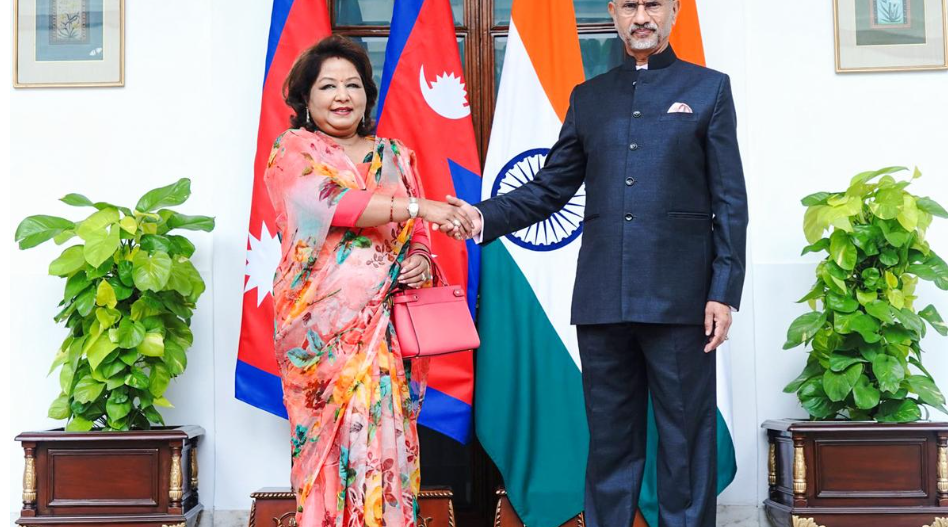Nepal to Export 1000 MW of Electricity to India (GS Paper 2, IR)

Introduction
- On August 19, 2024, India and Nepal reached a landmark agreement that will see Nepal exporting nearly 1,000 megawatts (MW) of electricity to India.
- This announcement came after a significant meeting between India’s External Affairs Minister S. Jaishankar and Nepalese Foreign Minister Arzu Rana Deuba in New Delhi.
- The deal is being hailed as a major milestone in the ongoing energy cooperation between the two countries, reflecting a deepening of their bilateral relationship.
Details of the Agreement
Energy Cooperation Expansion:
- Electricity Export Deal: The agreement to export 1,000 MW of electricity from Nepal to India represents a substantial increase in the energy collaboration between the two nations. This deal is expected to significantly enhance the energy security and stability of both countries, fostering economic growth and development.
- Strategic Importance: The electricity trade is particularly significant as it aligns with India's growing energy needs and Nepal's potential as a major energy exporter. The integration of Nepal’s hydropower resources into India’s grid will not only help meet India’s electricity demand but also provide Nepal with a stable revenue stream.
Broader Bilateral Discussions
Comprehensive Talks:
- Wide-Ranging Discussions: During their meeting, Jaishankar and Deuba engaged in extensive discussions covering a variety of topics beyond energy. These included trade, infrastructure development, and connectivity, highlighting the multifaceted nature of India-Nepal cooperation.
- Infrastructure Projects: The talks underscored ongoing infrastructure projects that are critical to enhancing connectivity between the two countries. These projects are designed to facilitate smoother trade and travel, thereby boosting economic integration.
High-Level Engagements:
- Diplomatic Meetings: Indian Foreign Secretary Vinay Kwatra met with Nepalese President Ramchandra Paudel and Prime Minister KP Sharma Oli, further emphasizing the importance of strengthening bilateral relations. These meetings focused on mutual interests and strategies for enhancing cooperation across various sectors.
- Previous Engagements: Jaishankar’s earlier visit to Nepal in January 2023 for the 7th India-Nepal Joint Commission meeting marked a significant step in addressing bilateral issues. The meeting, co-chaired with Nepalese Foreign Minister NP Saud, covered crucial topics such as trade, economic relations, and defense cooperation.
Historical and Ongoing Cooperation
Development and Assistance:
- Post-Earthquake Assistance: Following the devastating earthquake in 2015, India pledged substantial financial aid to Nepal, amounting to USD 1 billion. This aid included a grant of USD 250 million for various sectors such as housing, education, health, and heritage. The remaining USD 750 million was provided as a Line of Credit (LoC) for ongoing reconstruction and development projects.
- Community Development Projects: Since 2003, India has been actively involved in over 551 High Impact Community Development Projects (HICDPs) in Nepal. These projects, which cover areas like infrastructure, education, and healthcare, are part of the broader 'Nepal-India Development Cooperation' initiative and have significantly contributed to local development in Nepal.
Significance and Future Prospects
Economic and Strategic Impact:
- Enhanced Energy Security: The electricity export deal will contribute to energy security for both countries. For India, it ensures a reliable supply of power, particularly important for regions experiencing energy deficits. For Nepal, it provides a stable market for its hydropower resources, supporting economic growth.
- Strengthened Bilateral Ties: This agreement reflects a broader trend of deepening India-Nepal relations. By expanding cooperation in energy and other sectors, both nations are working towards a more integrated and mutually beneficial partnership.
Regional and Global Context:
- Regional Integration: The electricity deal is a step towards greater regional integration in South Asia, where energy cooperation can play a critical role in regional stability and economic development. By leveraging Nepal’s hydropower potential, India is contributing to a more interconnected and resilient regional energy market.
- Global Implications: The agreement also signals a commitment to sustainable energy solutions, aligning with global trends towards cleaner and more renewable energy sources. It underscores the importance of cross-border energy trade in addressing energy challenges and promoting sustainable development.
Conclusion
- The agreement for Nepal to export 1,000 MW of electricity to India is a significant development in the energy sector and a testament to the growing bilateral cooperation between the two countries.
- By integrating Nepal’s hydropower resources into India’s energy grid, both nations stand to gain economically and strategically.
- This landmark deal, coupled with ongoing infrastructure projects and historical aid initiatives, reflects a strong and evolving partnership aimed at enhancing regional stability and fostering sustainable development.
- As India and Nepal continue to collaborate on various fronts, this agreement will likely serve as a foundation for further cooperation and mutual growth in the future.


